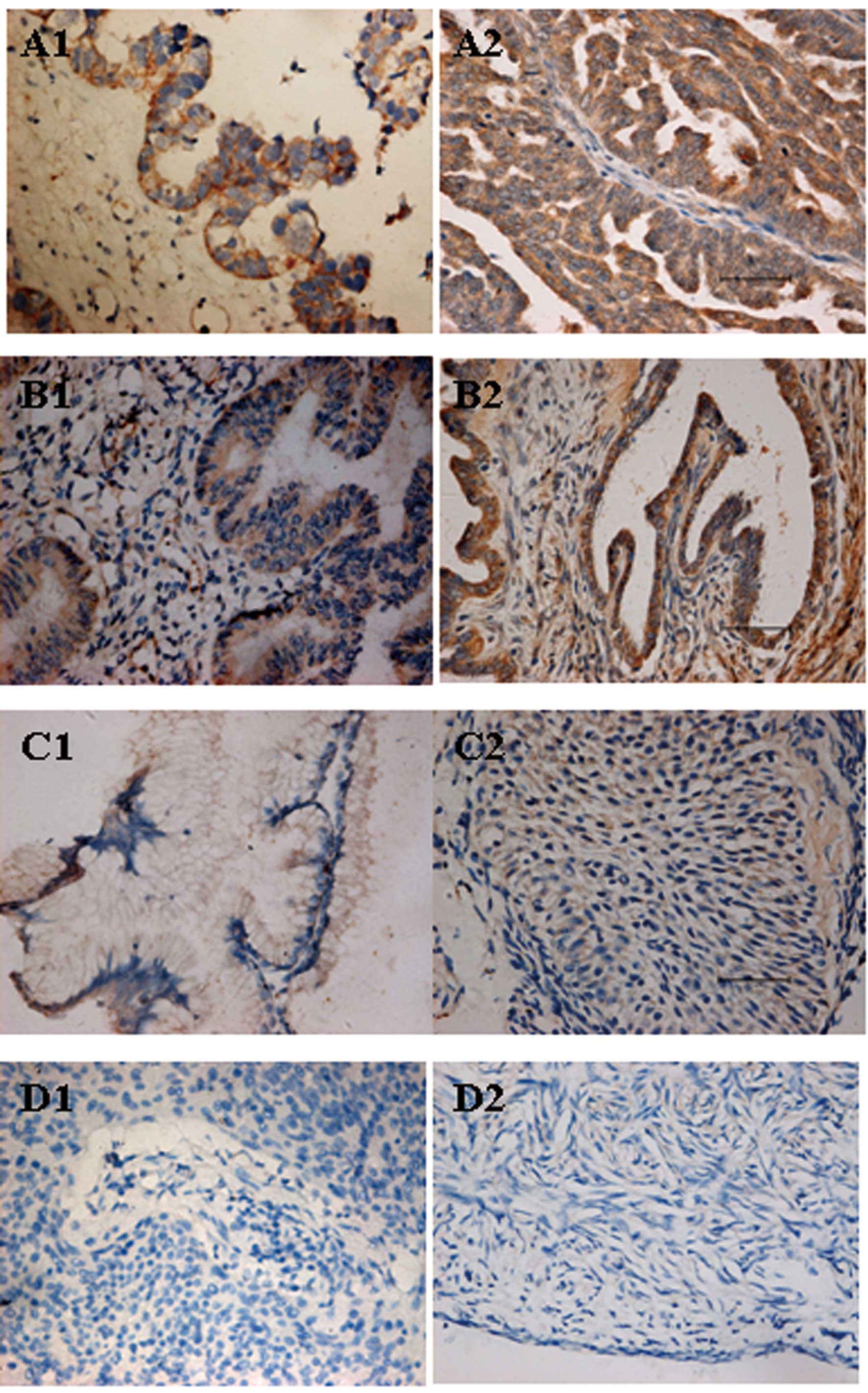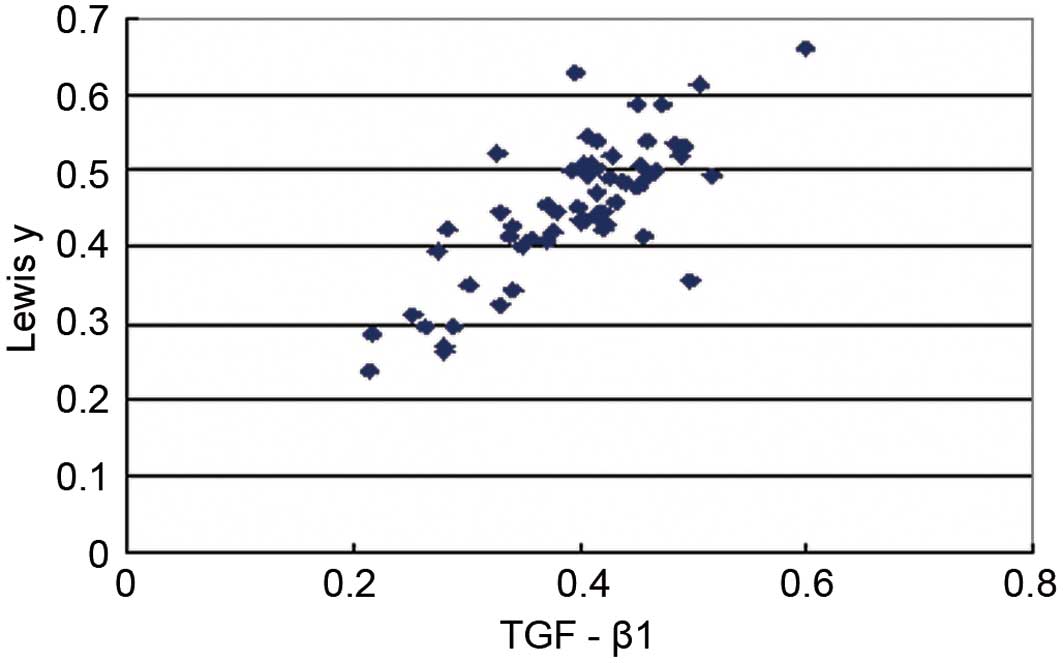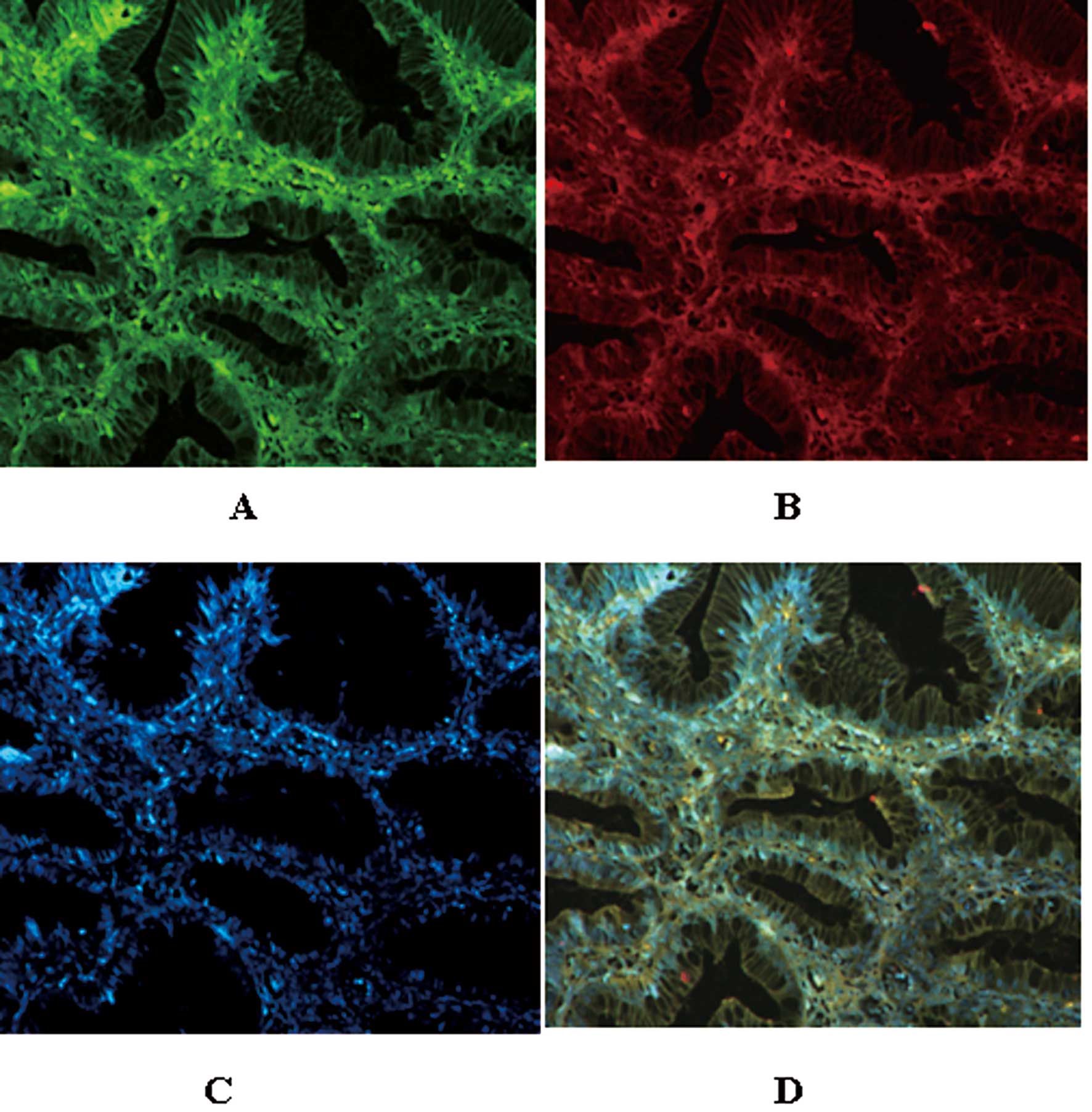|
1
|
Goupille C, Hallouin F, Meflah K and Le
Pendu J: Increase of rat colon carcinoma cells tumorigenicity by
alpha(1–2) fucosyltransferase gene transfection. Glycobiology.
7:221–229. 1997.PubMed/NCBI
|
|
2
|
Hellström I, Garrigues HJ, Garrigues U and
Hellström KE: Highly tumor-reactive, internalizing, mouse
monoclonal antibodies to Le(y)-related cell surface antigens.
Cancer Res. 50:2183–2190. 1990.PubMed/NCBI
|
|
3
|
Markowitz S: TGF-beta receptors and DNA
repair genes, coupled targets in a pathway of human colon
carcinogenesis. Biochim Biophs Acta. 1470:M13–M20. 2000.PubMed/NCBI
|
|
4
|
Shah AH and Lee C: TGF-beta-based
immunotherapy for cancer: breaching the tumor firewall. Prostate.
45:167–172. 2000. View Article : Google Scholar : PubMed/NCBI
|
|
5
|
Ahmed AA, Mills AD, Ibrahim AE, et al: The
extracellular matrix protein TGFBI induces microtubule
stabilization and sensitizes ovarian cancers to paclitaxel. Cancer
Cell. 12:514–527. 2007. View Article : Google Scholar
|
|
6
|
Iwamori M, Tanaka K, Kubushiro K, et al:
Alterations in the glyolipid composition and cellular properties of
ovarian carcinoma-derived RMG-1 cells on transfection of the
α1,2-fucosyltransferase gene. Cancer Sci. 96:26–30. 2005.PubMed/NCBI
|
|
7
|
Zhao Y, Lin B, Hao YY, Yan LM, Liu JJ, Zhu
LC and Zhang SL: The effects of Lewis(y) antigen content on drug
resistance to carboplatin in ovarian cancer line RMG-I. Prog
Biochem Biophys. 35:1175–1182. 2008.
|
|
8
|
Hao YY, Lin B, Zhao Y, et al:
alpha1,2-fucosyltransferase gene transfection influences on
biological behavior of ovarian carcinoma-derived RMG-1 cells. Fen
Zi Xi Bao Sheng Wu Xue Bao. 41:435–442. 2008.(In Chinese).
|
|
9
|
Zhu K, Amin MA, Zha Y, Harlow LA and Koch
AE: Mechanism by which H-2g, a glucose analog of blood group H
antigen, mediates angiogenesis. Blood. 105:2343–2349. 2005.
View Article : Google Scholar : PubMed/NCBI
|
|
10
|
Yasui T, Uemura H, Irahara M and Aono T:
Effects of transforming growth factor-beta on the production of
parathyroid hormone-related peptide in a human ovarian cancer cell
line in vitro. J Obstet Gynaecol Res. 23:231–238. 1997. View Article : Google Scholar : PubMed/NCBI
|
|
11
|
Derynck R and Zhang YE: Smad-dependent and
Smad-independent pathways in TGF-beta family signaling. Nature.
425:577–584. 2003. View Article : Google Scholar : PubMed/NCBI
|
|
12
|
de Caestecker MP, Piek E and Roberts AB:
Role of transforming growth factor-beta signaling in cancer. J Natl
Cancer Inst. 92:1388–1402. 2000.PubMed/NCBI
|
|
13
|
Hempel N, How T, Dong M, Murphy SK, Fields
TA and Blobe GC: Loss of betaglycan expression in ovarian cancer:
role in motility and invasion. Cancer Res. 67:5231–5238. 2007.
View Article : Google Scholar : PubMed/NCBI
|
|
14
|
Rodriguez GC, Haisley C, Hurteau J, Moser
TL, Whitaker R, Bast RC Jr and Stack MS: Regulation of invasion of
epithelial ovarian cancer by transforming growth factor-beta.
Gynecol Oncol. 80:245–253. 2001. View Article : Google Scholar : PubMed/NCBI
|
|
15
|
Hirashima Y, Kobayashi H, Suzuki M, Tanaka
Y, Kanayama N and Terao T: Transforming growth factor-beta1
produced by ovarian cancer cell line HRA stimulates attachment and
invasion through an up-regulation of plasminogen activator
inhibitor type-1 in human peritoneal mesothelial cells. J Biol
Chem. 278:26793–26802. 2003. View Article : Google Scholar
|
|
16
|
Bristow RE, Baldwin RL, Yamada SD, Korc M
and Karlan BY: Altered expression of transforming growth
factor-beta ligands and receptors in primary and recurrent ovarian
carcinoma. Cancer. 85:658–668. 1999. View Article : Google Scholar : PubMed/NCBI
|
|
17
|
Hakomori S: Tumor malignancy defined by
aberrant glycosylation and sphingo(glyco)lipid metabolism. Cancer
Res. 56:5309–5318. 1996.PubMed/NCBI
|
|
18
|
Breier G, Blum S, Peli J, Groot M, Wild C,
Risau W and Reichmann E: Transforming growth factor-beta and Ras
regulate the VEGF/VEGF-receptor system during tumor angiogenesis.
Int J Cancer. 97:142–148. 2002. View
Article : Google Scholar : PubMed/NCBI
|
|
19
|
Donovan D, Harmey JH, Toomey D, Osborne
DH, Redmond HP and Bouchier-Hayes DJ: TGF beta-1 regulation of VEGF
production by breast cancer cells. Ann Surg Oncol. 4:621–627. 1997.
View Article : Google Scholar : PubMed/NCBI
|
|
20
|
Li Y, Lin B, Hao YY, et al: Influence of
alpha1,2-fucosyltransferase gene transfection on vascular
endothelial growth factor in ovarian carcinoma-derived RMG-I cell
xenografts in nude mice. J China Med Univ. 3:284–289. 2008.(In
Chinese).
|
|
21
|
Wang PL, Lin B, Liu Q, Li Y, Li FF, Hao YY
and Zhang SL: Lewis y antigen promotes the expression of vascular
endothelial growth factor receptor in ovarian carcinoma-derived
RMG-I cells. J Modern Oncol. 17:1831–1835. 2009.
|
|
22
|
Liu JJ, Lin B, Hao YY, et al: Lewis(y)
antigen stimulates the growth of ovarian cancer cells via
regulation of the epidermal growth factor receptor pathway. Oncol
Rep. 23:833–841. 2010.PubMed/NCBI
|
|
23
|
Scott S, Kimura T, Ichinohasama R, et al:
Microsatellite mutations of transforming growth factor-beta
receptor type II and caspase-5 occur in human precursor T-cell
lymphoblastic lymphomas/leukemias in vivo but are not associated
with hMSH2 or hMLH1 promoter methylation. Leuk Res. 27:23–34. 2003.
View Article : Google Scholar
|
|
24
|
Langermans JA, Nibbering PH, Van Vuren-Van
Der Hulst ME and Van Furth R: Transforming growth factor-beta
suppresses interferon-gamma-induced toxoplasmastatic activity in
murine macrophages by inhibition of tumour necrosis factor-alpha
production. Parasite Immunol. 23:169–175. 2001. View Article : Google Scholar
|

















